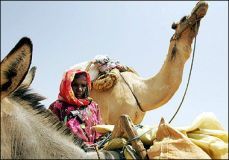US wants to aid Sudan, but not Khartoum government
WASHINGTON, April 7 (AFP) — The United States plans to contribute some 1.8 billion dollars to rebuild violence-plagued Sudan but wants to make sure its aid produces no political capital for the current government in Khartoum.

|
|
A Sudanese woman loads her donkey standing next to a camel at a relief delivery site in the Internally Displaced Persons (IDP) camp of Krinding in 2004. (AFP) . |
Deputy Secretary of State Robert Zoellick was to attend a Sudan donors conference in Oslo Tuesday before travelling on to the North African state and its devastated western region of Darfur.
US officials Thursday confirmed a report in the Washington Times that they were ready to offer nearly 1.8 billion dollars in reconstruction, development and humanitarian aid to Sudan over the next two years.
Zoellick was to pledge 900 million dollars, already appropriated, in Norway. The US administration was to ask Congress for another 400 million dollars this year and a similar sum in the next budget, the Times said.
Norwegian officials said Sudan needed some 7.8 billion dollars (six billion euros) by 2007 for reconstruction after the peace accord signed in January to end two decades of conflict in Sudan’s south.
But the US State Department made it clear that any US help should not end up as a windfall for the Khartoum government of President Omar al-Beshir.
“This is not money to support the Sudanese government as it’s now constituted,” State Department spokesman Richard Boucher told reporters.
“Any money that we spend from now on is to implement the north-south accords, which will create a new government in Khartoum, and to help the people of Darfur who are suffering, often at the hands of government-sponsored militia.”
An accord signed by Khartoum and the southern rebel Sudan People’s Liberation Movement/Army provided for the formation of a national unity government with a decentralised system of administration.
Washington has stressed that Sudan can expect no real improvement in relations without progress in ending the conflict in Darfur that has cost some 300,000 lives in two years and been branded genocide by the Americans.
Beshir has put himself further at odds with the United States and United Nations with a vow to resist prosecution of Darfur war crimes suspects in the International Criminal Court.
A State Department official, who asked not to be named, told AFP that any US assistance “was not meant to (produce) benefit or reward for the government of Sudan.”
He said the aid would generally be funneled through conduits such as the US Agency for International Development (USAID), non-governmental organizations or mulitlateral groups like the African Union or United Nations.
Officials said it was possible some aid might go to government agencies. But Boucher brushed aside a suggestion it might have been better to put off the donors’ conference until there was a change in Khartoum.
“I think it’s important to have a donors conference when these guys are trying to get up and running — that’s what we’re doing now — as well as when the situation in Darfur remains acute and needs some attention,” he said.
“And the sooner we can get the north-south accords implemented, the better off we are in trying to solve the problems of Darfur.”
Zoellick’s mission will follow a flurry of moves at the United Nations to restore order in Darfur and the rest of Sudan.
The UN Security Council last month approved 10,000 UN peacekeepers for Sudan to help shore up the north-south accord. It also voted for sanctions against those committing atrocities in Darfur.
Last week, the council ended weeks of diplomatic haggling by voting to refer Darfur cases to the International Criminal Court. Washington fiercely opposes the ICC but agreed to a compromise that gave Americans tighter protection against prosecution.
